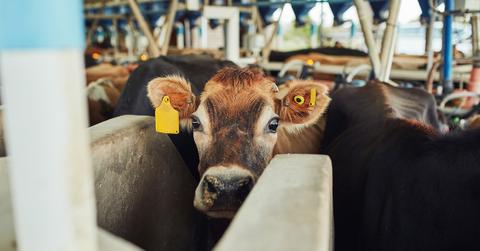Meat Taxes Might Be Coming to Save the Planet
A meat tax is controversial, but could be effective.
Updated Aug. 19 2019, 3:32 p.m. ET

A recent UN report declared that humans' consumption of meat and animal byproducts is having a significant negative impact on the Earth's land, which is a critical resource for global food security. One possible solution to reduce our appetite for animal flesh? A meat tax.
As reported by Business Insider, market research company Fitch Solutions recently published a report suggesting that more and more countries could implement taxes on red meat in the near future. A meat tax would fall under the "sin tax" umbrella, joining taxes on things like tobacco, sugar-laden foods, and sodas. Fitch Solutions first discussed the tax in an article called "Sustainability – Drivers And Implications For Agribusiness" earlier this year.
In the new report, Fitch Solutions explains why meat taxes could be the next big sin tax. “The global rise of sugar taxes makes it easy to envisage a similar wave of regulatory measures targeting the meat industry," Fitch Solutions said, according to Bloomberg. The firm added that we will most likely start seeing meat taxes in Western Europe, where Germany is already discussing the possibility (more on that below).
Similar to other sin taxes, one motivation behind a meat tax would be public health issues. Eating meat has been known to cause type 2 diabetes, pre-diabetes, high blood pressure, high cholesterol, heart disease, and obesity — so by upping the price on meat, nations with meat taxes could theoretically reduce the amount of people who contract these diseases.
But what would make a meat tax different from other sin taxes is the impact it could have on the environment and on the welfare of animals. According to the Food and Agriculture Organization of the United Nations' report Livestock's Long Shadow, animal agriculture causes an estimated 18 percent of global human-caused greenhouse gas emissions.
Not to mention, 56 billion or more land animals are killed for meat, eggs, and dairy every year, according to Animal Matters and Sentient Media. The less meat that humans buy, the fewer animals corporations will breed and slaughter for food — the lower the demand, the lower the supply.
By making meat less affordable, perhaps more people would turn to plant-based protein sources that produce less emissions, like beans, lentils, tofu, peas, and nuts. "Introducing a tax on meat would likely accelerate this trend, encouraging consumers to moderate consumption of red meat by switching to poultry or plant-based proteins," said Fitch Solutions, as per Business Insider. Conversely, it's important to note that sin taxes do not have any affect on the wealthy, but primarily on those in poverty — making these taxes more complex than they may seem, and a hot-button issue.
Earlier this month, a group of German politicians proposed increasing the tax on meat in Germany from 7 percent (what it is currently) to 19 percent (the current value added tax on most other goods), DW reported. Essentially, the German government is presently subsidizing meat by taxing it at a lower rate than other foods, making it more affordable to customers while still ensuring profits for the animal agriculture industry.
Interestingly, the U.S. also subsidizes meat products — just in a different way. The U.S. government actually pays factory farms "agricultural subsidies," aka money meant to "stabilize food prices, ensure plentiful food production, and to guarantee basic income to farmers," according to US Legal Support. However, 85 percent of that money is actually going to just 15 percent of farms (mostly large factory farms), according to research by the Cato Institute, as per ThoughtCo, meaning Americans' tax dollars are actually funding major factory farms, whether we like it or not.
It's clear that government subsidies have a massive effect on the animal agriculture industry and subsequently the foods we buy, the environment, and our health. While a meat tax would certainly be controversial in any country, it would be interesting to see how various countries would use the money collected from the tax.